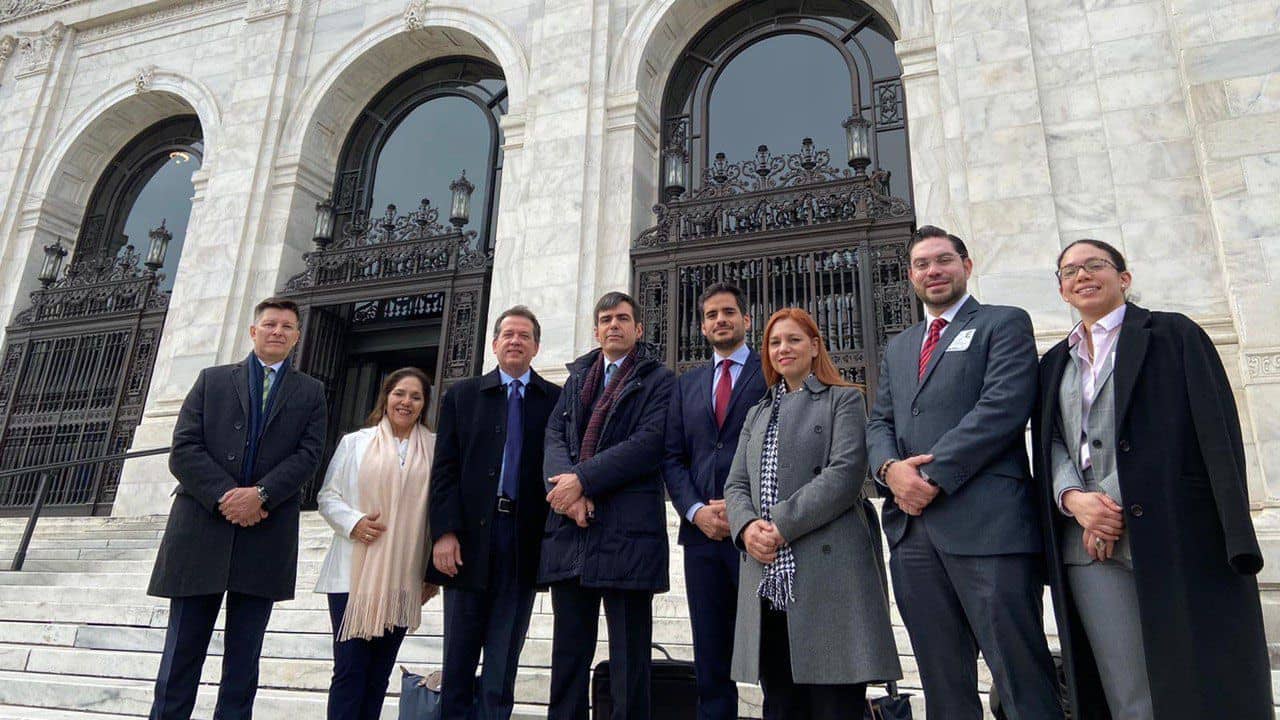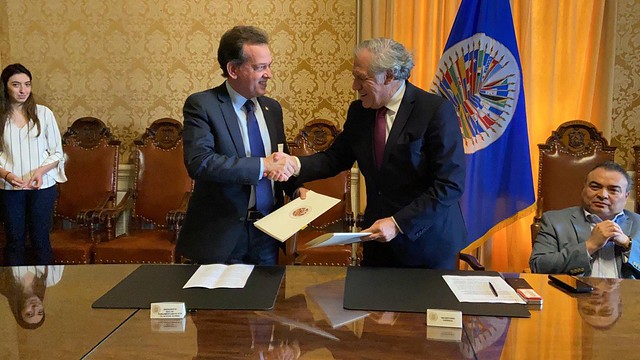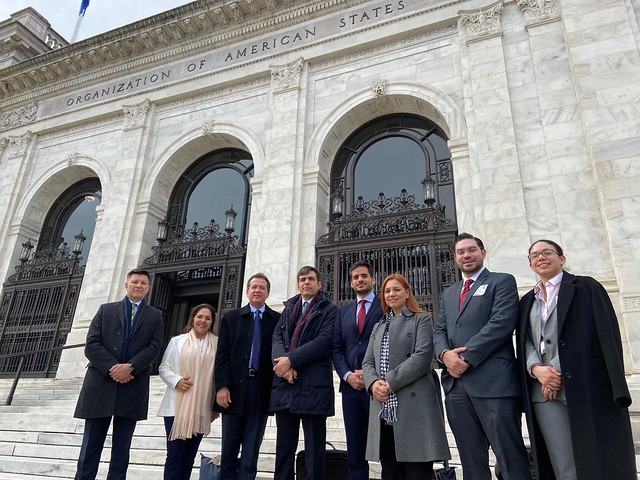
On 24 February 2020, the Organization of American States (OAS) and Parliamentarians for Global Action (PGA) signed a Memorandum of Understanding (MoU) between the two organizations and co-organized an institutional dialogue on the Role of Parliamentarians as Defenders of Democracy in the Digital Era. Being the first activity of PGA under its new core Campaign for Democratic Renewal and Human Rights, the meeting ushered in enhanced cooperation between the two institutions on topics of common interest, including the Legislative Power in the XXI Century; technological innovation in parliamentary management and communication; and cybersecurity challenges to the Legislative Power.
Democracy in the Digital Era
Since 2019, more than half of humanity is connected to the Internet and the struggle to preserve and protect democratic institutions is moving towards the cyberspace. Legislators must then adopt and adapt to new tools that allow them to become defenders of democracy in the 21st century
Information and Communication Technology (ICT) has an increasingly important role, including in political spaces and democratic processes. ICT allows for the modernization of government (E-governance) as well as dialogue and direct participation of constituents in democratic processes (E-democracy). If used appropriately, ICT can improve administrative and government services by providing more transparency and accountability of procedures, faster and efficient delivery of services, decrease in administrative costs and time spent on tasks, and allow greater access to services thanks to the availability of the Internet. Additionally, constituents not only instantaneously share information with each other but may interact with their elected representatives.
Democratic Renewal Campaign
At the initiative of Dip. Victor Bisonó, the high-level gathering of Latin American legislators at the OAS represented the first activity of PGA’s Campaign for Democratic Renewal and Human Rights. The Campaign aims to promote and safeguard multi-party democracy worldwide, defending democratic principles and institutions, inter alia by using new ICT. Regulations and best practices reinforcing and protecting civil and political democratic spaces, as well as the protection of the human rights of democracy activists, parliamentarians in opposition, women in politics, minorities and vulnerable groups, are at the core of the Campaign.
MoU and Institutional Dialogue
The event commenced in the morning with the official ceremony of signature of the MoU between the OAS, represented by Mr. Luis Almagro, Secretary-General (former Minister of Foreign Affairs of Uruguay), and PGA, represented by Dip. Victor Bisonó (Dominican Republic – Chairperson of the PGA International Council). The representatives of both institutions mentioned the fundamental role of legislators in protecting the integrity of democratic processes. Mr. Bisono made a strong call for action to uphold democracy and human rights in Latin American countries where there are systematic and widespread attacks against democratic principles and parliamentary democracy, such as in Venezuela and Nicaragua.
In the afternoon, the OAS hosted an Institutional Dialogue on the Role of Parliamentarians as Defenders of Democracy in the Digital Era, which counted on the participation of six legislators from Argentina, Dominican Republic, Ecuador, Honduras and Venezuela. The institutional dialogue was all the more important that partners of PGA on many its campaigns were in attendance, including The Pew Charitable Trusts, the Environmental Law Institute, and the National Democratic Institute. PGA was also pleased to count on the participation of the UNSCR 1540 Coordinator at the OAS.
At the outset of the exchanges, the Secretary-General of PGA explained that the signature of the MoU is a strategic moment for the Organization as it allows PGA to work with the most important regional organization of the hemisphere.
In the first panel dedicated to the legislative power in the 21st century, Mr. Moises Benamor, Head of the Legislative Unit of the OAS, gave an overview of the state of democracy in Latin America. The premise of the presentation was that the progressive decline of citizen engagement with democratic institutions, including parliaments, is due to the perceived lack of transparency and corruption. In that regard, ICT is an important tool to bring about more transparency and openness to governance.
The work we have to do is one of socialization of norms so that countries know the tools available to them. For instance, the Inter-American Democratic Charter is a central instrument that is not well known. Its cross-cutting subject-matter encompasses gender equality, transparency, technology, access to information to uphold democratic institutions of the Americas. Considering that to be implemented at the domestic level, the Charter needs the approval of parliament, Dip. Jorge Calix (Honduras), PGA Board member, stressed that PGA is in a position to promote the implementation of this instrument in light of its far-reaching membership.
Dip. Armando Armas (Venezuela), Chairperson of the PGA National Group in Venezuela, raised the question on how to defend parliamentarians and democratic institutions through the use of ICT for democratic renewal. Political institutions are traditionally the hardest and latest to change and adapt to technology and are seen as obsolete by citizens. While democratic institutions lack flexibility, authoritarian systems are taking advantage of technology to misinform civilians and undermine democratic principles and processes.
As mentioned by Dip. Calix, to operate these changes, countries must invest in digital democracy. It is important to build a climate of trust to foster such reforms and parliamentarians can play a strong role as not only do they vote the budget, they also oversee the work of the Executive and can propose pieces of legislation on the topic.
However, some parliamentarians are at a disadvantage if they are not in the ruling political party. The right to have parliamentary advisers is not upheld. A solution that already exists in other countries such as Ecuador, which was confirmed by Dip. Amapola Naranjo, is to have an organic law that grants the same quotas of advisers to each parliamentarian to ensure that the technical parliamentary staff may build capacity and institutional memory.
The disaffection of constituents towards democracy has had a profound effect on the communication culture of the legislative power. Parliamentarians can establish a relationship of tolerance, respect, dialogue and political negotiation with constituents through the proper use ICT. To this end, the Support Unit to Representative Institutions of the OAS has been working on concrete actions in the region, including:
-
Promoting dialogue and cooperation between parliaments in the region
-
Universalizing the right to information of public affairs
-
Increasing the transparency of internal management of parliaments and strengthening the capacity of representatives of political agendas
-
Establishing a climate for good cooperation through ICT for better political leadership
-
Reducing the gap of participation between civil society, ethnic and minority groups, the private sector, and the representatives of the Legislative Power.
Political communication should be more efficient, ethical, and genuine so that citizens feel willing and able to interact with their representatives in a climate of trust, respect and credibility, in conformity with democratic values. A two-way communication needs to be established between democratic institutions and politicians on the one hand and the citizens on the other hand, through ICT.
Strong socio-economic disparities, which account for technological disparities even in the same neighborhood, are also an important aspect of the disaffection of certain populations for democratic institutions. To remedy these gaps, laws and public policies to universalize technological alphabetization and ensure digital inclusion are needed.
Furthermore, the lack of management capacity within democratic institutions prevent the country from receiving international funds available from institutions such as the World Bank. Hence why it is paramount that parliaments allocate budgetary resources to digital capacity-building.
Particularly, parliamentarians have a big role to play by elaborating and proposing laws on the access of information. Dip. Karina Banfi explained the process and difficulties that Argentina is confronting when it comes to access to public information. Law 27.275 on Access to Public Information in Argentina aims to increase transparency and promote anti-corruption measures.
Mr. Mike Mora, a specialist in open and digital government at the OAS, presented some tools on ICT, open data and the link with parliamentary work. The OAS is assisting States to make a paradigm shift from open governments to open States. Parliamentarians are to vote laws to frame and regulate open governments. ICT offers an incredible opportunity to States to tackle systemic issues plaguing democratic institutions and citizen engagement with their representatives. However, digital transformation carries different sets of risks, including cybercrimes and cyberwarfare that have already undermined democratic processes, including elections.
Another important aspect of the integrity of democratic processes is cybersecurity. There are international instruments that address cybercrimes such as the Budapest Convention on Cybercrime. Certifications on the topic can be granted to legislators and technical staff of parliaments. In that regard, Mr. Belisario Contreras, chief of the cybersecurity program of the OAS, explained how his office has been engaging with 34 OAS Member States through various activities on cybersecurity as well as with other regional organization such as the European Union, the African Union and the Commonwealth, to exchange best practices.
Some initiatives in the Latin American region include that of the Pacific Alliance, an initiative of regional integration comprised of Chile, Colombia, Mexico and Peru, officially established on April 28th, 2011. The objective of the Alliance is digital integration on economy, connectivity, government and ecosystem. To illustrate cybersecurity parliamentary initiatives in the region, Dip. Jose Luis Riccardo mentioned pieces of legislation that are being elaborated for a more qualitative and secure democracy, with strong credibility and citizen participation. Cybersecurity deals with all facets of the life of democracies, including the economy, politics and culture.



